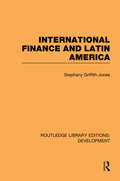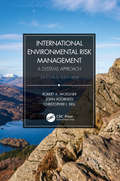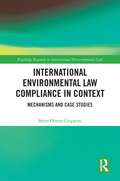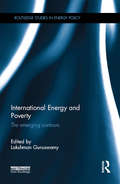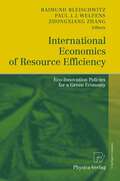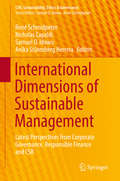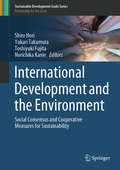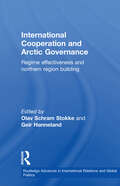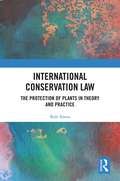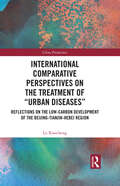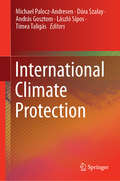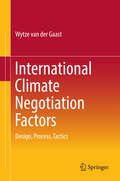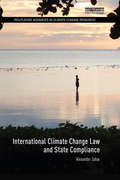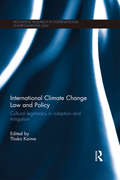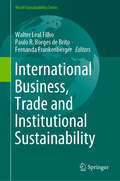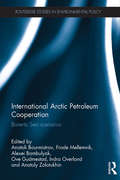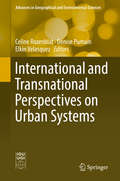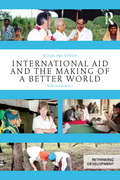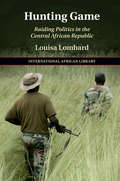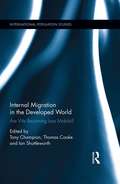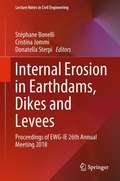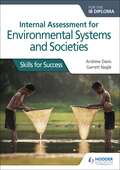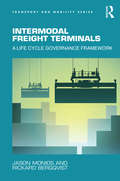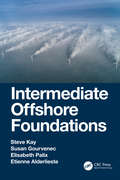- Table View
- List View
International Finance and Latin America (Routledge Library Editions: Development)
by Stephany Griffith-JonesThis reissue, initially published in 1984, examines the evolution of international financial flows to Latin America since 1945, along with their implications for National Development . The book describes how, in each of the first three decades since the war, a new agency emerged (foreign investors in the 1950s, official aid agencies in the 1960s and multinational banks in the 1970s) which was willing to play a dynamic role in generating new financial flows to the region. The lack of such an agent in the 1980s, combined with a reluctance on the part of former investors to maintain their level of assistance culminated in an economic debt crisis in Latin America which this work seeks to address, asking the crucial question: what measures should be taken – both nationally and internationally – to deal with this critical issue , in a way that will both encourage Latin American Development and avoid a major international financial crisis?
International Environmental Risk Management: A Systems Approach
by Robert A. Woellner John Voorhees Christopher L. BellBased on the first edition with extensive analysis of practical applications of environmental risk management and compliance management systems, this second edition of International Environmental Risk Management reflects updates made in the understanding and application of risk management best practices and makes available a frame of reference and systematic approach to environmental and social governance (ESG). It provides a pathway for readers to implement environmental management strategies that can be integrated with core operations and other risk management efforts, including supporting sustainability and corporate social responsibility initiatives associated with climate change, the circular economy or supply chain conditions, as well as enterprise risk management; anti-bribery, and other compliance management systems. This book provides in-depth discussions of ways to use global environmental management standards. New features in this edition: Combines EMS standards with discussion of specific principles, other authors’ research, and guidelines on management practices. Provides guidelines on how to prepare for, anticipate, and resolve environmental issues. Includes easily understandable information for all readers and is not simply aimed toward individuals who are knowledgeable about this topic. Provides in-depth discussions on using global environmental management standards to manage risk and promote resilience, as well as legal strategies and voluntary initiatives that companies can utilize to minimize risk. Accounts for the substantive revisions in ISO 14001:2015. As a growing and rapidly changing field, it is necessary to address new issues, guidelines, and regulations to assist businesses, academia, students, consultants, lawyers, and environmental managers with a pragmatic resolution to environmental risk management issues. This second edition gives a broad and detailed analysis of the changes made to international standards and practices and serves as an excellent guide to managing environmental risk.
International Environmental Law Compliance in Context: Mechanisms and Case Studies (Routledge Research in International Environmental Law)
by Belen Olmos GiupponiThis book explores how compliance with international environmental law has changed over time, offering a critical analysis of its current shifting patterns. Beginning with an overview of compliance with international environmental law, the book goes on to explore in detail: compliance in the different legal regimes instituted by Multilateral Environmental Agreements (MEAs), the addition of new subjects of international law, the legal relations between developed and developing countries, and the emergence of new compliance mechanisms in global environmental law. The analysis takes two key developments into consideration: the evolution in forms of compliance and non-state involvement in compliance with international environmental law. In the final section, three case studies are provided to demonstrate how these changes have occurred in selected areas: climate change, biodiversity and water resources. Throughout the book, topics are illustrated with extracts from specific international environmental law jurisprudence and relevant international environmental law instruments. In doing so, the book offers a comprehensive analysis of compliance with international environmental law, providing original insights and following a clear and systematic structure supported by reference to the sources. This book will be of interest to professionals, academics and students working in the field of compliance with international environmental law.
International Energy and Poverty: The emerging contours (Routledge Studies in Energy Policy)
by Lakshman GuruswamyAround 2.8 billion people globally, also known as the "Other Third" or "energy poor", have little or no access to beneficial energy that meets their needs for cooking, heating, water, sanitation, illumination, transportation, or basic mechanical power. This book uniquely integrates the hitherto segmented and fragmented approaches to the challenge of access to energy. It provides theoretical, philosophical and practical analysis of energy for the low energy (non-hydrocarbon based) Other Third of the world, and how the unmet needs of the energy poor might be satisfied. It comprehensively addresses the range of issues relating to energy justice and energy access for all, including affordable - sustainable energy technologies (ASETs). The book breaks new ground by crafting a unified and cohesive framework for analysis and action that explains the factual and socio-political phenomenon of the energy poor, and demonstrates why clean energy is a primary determinant of their human progress. This is a must-read for all scholars, students, professionals and policy makers working on energy policy, poverty, and sustainable energy technologies.
International Economics of Resource Efficiency: Eco-Innovation Policies for a Green Economy
by Zhongxiang Zhang Paul J.J. Welfens Raimund BleischwitzHuman societies face a threatening future of resource scarcity and environmental damages. This book addresses the challenge of turning these risks into opportunities and policies. It is a collection of high level contributions from experts of sustainable growth and sustainable resource management. Focussing on economics, sustainability, technology and policy, the book highlights system innovation, leapfrogging strategies of emerging economies, possible rebound effects and international market development. It puts natural resources centre stage and will make an important contribution to achieving the goal of a 21st century Green Economy.
International Dimensions of Sustainable Management: Latest Perspectives from Corporate Governance, Responsible Finance and CSR (CSR, Sustainability, Ethics & Governance)
by Nicholas Capaldi Samuel O. Idowu René Schmidpeter Anika Stürenberg HerreraThis book provides a rich collection of essays discussing and showcasing the transformation of businesses around the world towards sustainability and responsibility. Based on a framework of global theoretical approaches, it presents practical examples and cases from a variety of industries, regions and corporate functions. It also highlights the latest insights on how corporations consider sustainability in the governance of their respective organization. Furthermore, the book features a section dedicated to responsible finance, and outlines business and management-driven approaches that contradict the traditionally held belief that a trade-off exists between sustainability, social responsibility and profit.
International Development and the Environment: Social Consensus and Cooperative Measures for Sustainability (Sustainable Development Goals Series)
by Shiro Hori Yukari Takamura Toshiyuki Fujita Norichika KanieThis book analyzes the interplay between development and the environment, focusing on how to forge social consensus and practices in the international community. Since the Rio Earth Summit in 1992, sustainable development has increasingly attracted the attention of the international community, and several international agreements have been concluded to combat issues such as climate change. The Sustainable Development Goals (SDGs) were introduced as common objectives, and the Paris Agreement was adopted as a subsequent outcome. In light of today’s globalized world, how to best achieve sustainable development—and prioritize climate change in particular—is an issue involving various perspectives on the environment and economic development in the global community.The book provides students, businesspeople and government officials with a concept of sustainable development that is based on using social consensus, social norms, and practices (cooperative global actions) to achieve common goals. It is divided into three parts, the first of which focuses on the goals and development needed to achieve sustainable development. The second part explores measures to promote sustainable development, while the third highlights current climate change issues and aspects related to the effective implementation of international frameworks.
International Cooperation and Arctic Governance: Regime Effectiveness and Northern Region Building (Routledge Advances in International Relations and Global Politics)
by Olav Schram Stokke Geir HønnelandA new exploration of the impacts of Arctic regimes in such vital areas as pollution, biodiversity, indigenous affairs, health and climate change. The post-Cold War era has seen an upsurge in interest in Arctic affairs. With new international regimes targeting Arctic issues at both the global and regional levels, the Northern areas seem set to play an increasingly prominent role in the domestic and foreign policies of the Arctic states and actors – not least Russia, the USA and the EU. This volume clearly distinguishes between three key kinds of impact: effectiveness, defined as mitigation or removal of specific problems addressed by a regime political mobilization, highlighting changes in the pattern of involvement and influence in decision making on Arctic affairs region building, understood as contributions by Arctic institutions to denser interactive or discursive connectedness among the inhabitants of the region. Empirically, the main focus is on three institutions: the Arctic Council, the Barents Euro-Arctic Region and the Council of the Baltic Sea States. International Cooperation and Arctic Governance is essential reading for all students with an interest in Arctic affairs and their impact on global society.
International Conservation Law: The Protection of Plants in Theory and Practice
by Rob AmosThrough a combination of theoretical and empirical approaches, this book explores the role of international environmental law in protecting and conserving plants. Underpinning every ecosystem on the planet, plants provide the most basic requirements: food, shelter and clear air. Yet the world’s plants are in trouble; a fifth of all plant species are at risk of extinction, with thousands more in perpetual decline. In a unique study of international environmental law, this book provides a comprehensive overview of the challenges and restrictions associated with protecting and conserving plants. Through analysing the relationship between conservation law and conservation practice, the book debates whether the two work symbiotically, or if the law poses more of a hindrance than a help. Further discussion of the law’s response to some of the major threats facing plants, notably climate change, international trade and invasive species, grounds the book in conservation literature. Using case studies on key plant biomes to highlight the strengths and weaknesses of the law in practice, the book also includes previously unpublished results of an original empirical study into the correlations between the IUCN Red List and lists of endangered/protected species in international instruments. To conclude, the book looks to the future, considering broader reforms to the law to support the work of conservation practitioners and reshape humanity’s relationships with nature. The book will be of interest to scholars and students working in the field of international environmental law and those interested more broadly in conservation and ecological governance frameworks.
International Comparative Perspectives on the Treatment of “Urban Diseases”: Reflections on the Low-Carbon Development of the Beijing-Tianjin-Hebei Region (China Perspectives)
by Lu XiaochengWith an integration of theories, comparative and empirical studies, this book aims to find a treatment for Beijing’s “urban diseases” and coordinate a low-carbon development plan for the Beijing-Tianjin-Hebei region in China. Unprecedented industrialization and unconventional urbanization caused a series of “urban diseases” for developing cities across the globe. By summarizing and exploring the evolution and phased characteristics of “urban diseases”, the author implements theories across classical sociology, human ecology, community school, and low-carbon city as the base for policy recommendations. This book also provides in-depth examinations and comparative studies of other metropolises’ experiences in controlling “urban diseases”. Cities such as New York, London, and Tokyo were modeled to propose the most appropriate low-carbon development plan for the Beijing-Tianjin-Hebei region. With a focus on developing cities in Northern China, this book will be a great read to all scholars and students of environmental studies, development studies, urban studies, and contemporary China studies. It will also be a great addition for those who are interested in social conflicts and economic development.
International Climate Protection
by Michael Palocz-Andresen Dóra Szalay András Gosztom László Sípos Tímea TaligásThis book explains the current climate protection processes and technologies, and informs the readers of the limiting factors and opportunities for future development. It represents the highest level of knowledge from leading scientists all over the world. Original high quality figures maximize understanding of the text. The book also introduces a new concept (climatographic), which provides a well pronounced solution to climate protection that is easily understandable for all levels of readers.
International Climate Negotiation Factors
by Wytze GaastProviding a detailed examination of climate negotiations records since the 1990s, this book shows that, in addition to agreeing on climate policy frameworks, the negotiations process is of crucial importance to success. Shedding light on the dynamics of international climate policymaking, its respective chapters explore key milestones such as the Kyoto Protocol, Marrakech Accords, Cancun Agreement and Doha Framework. The book identifies a minimum of three conditions that need to be fulfilled for successful climate negotiations: the negotiations need to reflect the fact that climate change calls for global solutions; the negotiation process must be flexible, including multiple trajectories and several small steps; and decisive tactical maneuvers need to be made, as much can depend on, for example, personalities and the negotiating atmosphere. With regard to the design of an international climate policy regime, the main challenge presented has been the inability to agree on globally supported greenhouse gas emission reduction measures. The book offers an excellent source of information for researchers, policymakers and advisors alike.
International Climate Change Law and State Compliance (Routledge Advances in Climate Change Research)
by Alexander ZaharA solution to the problem of climate change requires close international cooperation and difficult reforms involving all states. Law has a clear role to play in that solution. What is not so clear is the role that law has played to date as a constraining factor on state conduct. International Climate Change Law and State Compliance is an unprecedented treatment of the nature of climate change law and the compliance of states with that law. The book argues that the international climate change regime, in the twenty or so years it has been in existence, has developed certain normative rules of law, binding on states. State conduct under these rules is characterized by generally high compliance in areas where equity is not a major concern. There is, by contrast, low compliance in matters requiring a burden-sharing agreement among states to reduce global greenhouse gas emissions to a ‘safe’ level. The book argues that the substantive climate law presently in place must be further developed, through normative rules that bind states individually to top-down mitigation commitments. While a solution to the problem of climate change must take this form, the law’s development in this direction is likely to be hesitant and slow.The book is aimed at scholars and graduate students in environmental law, international law, and international relations.
International Climate Change Law and Policy: Cultural Legitimacy in Adaptation and Mitigation (Routledge Research in International Environmental Law)
by Thoko KaimeClimate change poses fundamental and varied challenges to all communities across the globe. The adaptation and mitigation strategies proposed by governments and non-governmental organisations are likely to require radical and fundamental shifts in socio-political structures, technological and economic systems, organisational forms, and modes of regulation. The sheer volume of law and policy emanating from the international level makes it uncertain which type of regulatory or policy framework is likely to have a positive impact. The success or failure of proposed measures will depend on their acceptability within the local constituencies within which they are sought to be applied. Therefore there is an urgent need to better comprehend and theorise the role of cultural legitimacy in the choice and effectiveness of international legal and policy interventions aimed at tackling the impact of climate change. The book brings together experts to present perspectives from different disciplines on the issue of international climate change law and policy. Beginning from the premise that legitimacy critiques of international climate change regulation have the capacity to positively influence policy trends and legal choices, the book showcases innovative ideas from across the disciplines and investigate the link between the efficacy of international legal and policy mechanisms on climate change and cultural legitimacy. The book includes chapters on with a theoretical basis as well as specific case-studies from around the globe. The topics covered include: land use planning as a tool of enhancing cultural legitimacy, indigenous peoples in international environmental negotiations, transnational advocacy networks, community-based forestry management and culture and voluntary social movements.
International Business, Trade and Institutional Sustainability (World Sustainability Series)
by Walter Leal Filho Paulo R. Borges de Brito Fernanda FrankenbergerThis book addresses the gap between innovative technologies and their adoption. It showcases research, feasibility studies and projects that demonstrate a variety of ways to implement environmental sustainability in globally operating firms, as well as best practices in areas such as international management, adoption of cleaner technologies, global supply chains, greenhouse gas emission reduction, and transportation.The book provides state-of-the-art information on issues including:Global sustainable management practicesGlobal sustainable food and agricultural marketsGlobal responsible mining and energyGlobal sustainable sourcingGlobal sustainable transportationGlobal conservation innovations and investmentsPresenting expert contributions from industry, government and academia, discussing a variety of themes and perspectives on the topic "international business as a positive force of environmental sustainability” it is a vital resource for stakeholders in the international business community.
International Arctic Petroleum Cooperation: Barents Sea Scenarios (Routledge Studies in Environmental Policy)
by Indra Overland Anatoli Bourmistrov Frode Mellemvik Alexei Bambulyak Ove Gudmestad Anatoly ZolotukhinThe Arctic region contains large amounts of natural resources considered necessary to sustain global economic growth, so it is unsurprising that it is increasingly susceptible to political, economic, environmental, and even military conflicts. This book looks in detail at the preconditions and outlook for international cooperation on the development of Arctic petroleum resources, focusing on Norwegian–Russian cooperation in the Barents Sea towards 2025. The authors provide a cross-disciplinary approach including geopolitical, institutional, technological, corporate and environmental perspectives to analyse the underlying factors that shape the future development of the region. Three future scenarios are developed, exploring various levels of cooperation and development influenced by and resulting from potential political, commercial and environmental circumstances. Through these scenarios, the book improves understanding of the challenges and opportunities for Arctic petroleum resource development and promotes further consideration of the possible outcomes of future cooperation. The book should be of interest to students, scholars and policy-makers working in the areas of Arctic studies, oil and gas studies, energy security, global environmental governance, environmental politics and environmental technology.
International and Transnational Perspectives on Urban Systems (Advances in Geographical and Environmental Sciences)
by Elkin Velasquez Denise Pumain Celine RozenblatThis book reviews the recent evolutions of cities in the world according to entirely revised theoretical fundamentals of urban systems. It relies on a vision of cities sharing common dynamic features as co-evolving entities in complex systems. Systems of cities that are interdependent in their evolutions are characterized in the context of that dynamics. They are identified on various geographical scales—worldwide, regional, or national. Each system exhibits peculiarities that are related to its demographic, economic, and geopolitical history, and that are underlined by the systematic comparison of continental and regional urban systems, following a common template throughout the book. Multi-scale urban processes, whether local (one city), or within national systems (systems of cities), or linked to the expansion of transnational networks (towards global urban systems) throughout the world over the period 1950–2010 are deeply analyzed in 16 chapters. This global overview challenges urban governance for designing policies facing globalization and the subsequent ecological transition. The answers, which emerge from the diversity of situations in the world, add some reflections on and recommendations to the “urban system framework” proposed in the Habitat III agenda.
International Aid and the Making of a Better World: Reflexive Practice (Rethinking Development)
by Rosalind EybenHow can international aid professionals manage to deal with the daily dilemmas of working for the wellbeing of people in countries other than their own? A scholar-activist and lifelong development practitioner seeks to answer that question in a book that provides a vivid and accessible insight into the world of aid – its people, ideas and values against the backdrop of a broader historical analysis of the contested ideals and politics of aid operations from the 1960s to the present day. Moving between aid-recipient countries, head office and global policy spaces, Rosalind Eyben critically examines her own behaviour to explore what happens when trying to improve people’s lives in far-away countries and warns how self-deception may construct obstacles to the very change desired, considering the challenge to traditional aid practices posed by new donors like Brazil who speak of history and relationships. The book proposes that to help make this a better world, individuals and organisations working in international development must respond self-critically to the dilemmas of power and knowledge that shape aid’s messy relations. Written in an accessible way with vignettes, stories and dialogue, this critical history of aid provides practical tools and methodology for students in development studies, anthropology and international studies and for development practitioners to adopt the habit of reflexivity when helping to make a better world.
The International African Library: Raiding Politics In The Central African Republic (The\international African Library #61)
by Louisa LombardInternal Migration in the Developed World: Are we becoming less mobile? (International Population Studies)
by Tony Champion Thomas Cooke Ian ShuttleworthThe frequency with which people move home has important implications for national economic performance and the well-being of individuals and families. Much contemporary social and migration theory posits that the world is becoming more mobile, leading to the recent ‘mobilities turn’ within the social sciences. Yet, there is mounting evidence to suggest that this may not be true of all types of mobility, nor apply equally to all geographical contexts. For example, it is now clear that internal migration rates have been falling in the USA since at least the 1980s. To what extent might this trend be true of other developed countries? Drawing on detailed empirical literature, Internal Migration in the Developed World examines the long-term trends in internal migration in a variety of more advanced countries to explore the factors that underpin these changes. Using case studies of the USA, UK, Australia, Japan, Sweden, Germany and Italy, this pioneering book presents a critical assessment of the extent to which global structural forces, as opposed to national context, influence internal migration in the Global North. Internal Migration in the Developed World fills the void in this neglected aspect of migration studies and will appeal to a wide disciplinary audience of researchers and students working in Geography, Migration Studies, Population Studies and Development Studies.
Internal Erosion in Earthdams, Dikes and Levees: Proceedings Of Ewg-ie 26th Annual Meeting 2018 (Lecture Notes in Civil Engineering #17)
by Stéphane Bonelli Cristina Jommi Donatella SterpiThis book gathers the peer-reviewed contributions presented at the 26th Annual Meeting of the European Working Group on Internal Erosion in Embankment Dams, Levees and Dikes, and their Foundations (EWG-IE), held in Milano, Italy, on 10-13 September 2018. The meeting served as a fertile platform for discussion, sharing sound knowledge and introducing novel ideas on issues related to soil internal erosion in water retaining structures. The contributions encompass various aspects of laboratory techniques and findings, modelling and design criteria as well as prevention measures and field assessment. The book is a valuable, up-to-date tool that provides an essential overview of the subject for scientists and practitioners alike, and inspires further investigations and research.
Internal Assessment for Environmental Systems and Societies for the IB Diploma: Skills for Success
by Andrew Davis Garrett NagleSupport students through the Internal Assessment with advice and guidance including how to choose a topic, approach the investigation and analyse and evaluate results.- Build investigative and analytical skills through a range of strategies and detailed examiner advice and expert tips- Ensure understanding of all IB requirements with clear, concise explanations on the assessment objectives and rules on academic honesty, as well as explicit reference to the IB Learner Profile and ATLS throughout- Encourage students to achieve the best grade with advice and tips, including common mistakes to avoid, exemplars, worked answers and commentary, helping students to see the application of facts, principles and concepts- Reinforce comprehension of the skills with activity questions- Support visual learners with infographics at the start of every chapter
Internal Assessment for Environmental Systems and Societies for the IB Diploma: Skills for Success
by Andrew Davis Garrett NagleSupport students through the Internal Assessment with advice and guidance including how to choose a topic, approach the investigation and analyse and evaluate results.- Build investigative and analytical skills through a range of strategies and detailed examiner advice and expert tips- Ensure understanding of all IB requirements with clear, concise explanations on the assessment objectives and rules on academic honesty, as well as explicit reference to the IB Learner Profile and ATLS throughout- Encourage students to achieve the best grade with advice and tips, including common mistakes to avoid, exemplars, worked answers and commentary, helping students to see the application of facts, principles and concepts- Reinforce comprehension of the skills with activity questions- Support visual learners with infographics at the start of every chapter
Intermodal Freight Terminals: A Life Cycle Governance Framework (Transport and Mobility)
by Jason Monios Rickard BergqvistMuch work has been done on port governance yet little has addressed intermodal terminal governance, despite the clear similarities. This book fills that gap by establishing a governance framework for situating analysis of intermodal terminals throughout their life cycle. A version of the product life cycle theory is amended with governance theory to produce a framework covering each stage of the terminal’s life cycle, from the initial planning to the many decisions taken regarding the public/private split in funding mechanisms, ownership, selecting an operator, specifying KPIs to the operator, setting fees, earning profit, ensuring fair access to all rail service operators, and finally to reconcessioning the terminal to a new operator, managing the handover and maintaining the terminal throughout its life cycle. An institutional analysis of stakeholder relations, situated within a governance framework, illuminates these issues and enables not only conceptualisation and greater understanding of the geography of intermodal transport, but also decision-making and goal-setting by planners and policy makers. This book thus has three functions: first, as a textbook on the planning and operation of intermodal terminals; second, as a presentation of recent empirical research on intermodal terminal governance; third, as a framework for future research in which the broad field of analysis of intermodal transport can be viewed through a single lens and used to inform geographers, policymakers and planners.
Intermediate Offshore Foundations
by Steve Kay Susan Gourvenec Elisabeth Palix Etienne AlderliesteThe late Steve Kay was an independent geotechnical consultant with thirtythree years’ experience as a principal engineer with Fugro, and over fortyfive years as a geotechnical specialist, mainly in the oil and gas industry, both with contractors and consultants. His expertise was in shallow and intermediate (caisson, bucket, can) foundation design, with extensive worldwide experience in offshore, nearshore and land engineering. He gave suction foundation courses and master classes and wrote the commercially available software package CAISSON_VHM. Susan Gourvenec is Royal Academy of Engineering Chair in Emerging Technologies in Intelligent & Resilient Ocean Engineering, and Professor of Offshore Geotechnical Engineering at the University of Southampton, UK. Susan is currently Convenor of the International Standardisation Organisation (ISO) committee responsible for developing industry standards for marine soil investigation, marine geophysical investigation and offshore geotechnical design. Susan co-authored Offshore Geotechnical Engineering (CRC Press, 2011) and co-edited the proceedings of the inaugural and second International Symposia on Frontiers in Offshore Geotechnics (ISFOG). Elisabeth Palix has eighteen years’ experience in offshore geotechnics. She spent twelve years working for Fugro Geoconsulting before joining EDF Renouvelables, where she is working on design and installation aspects of offshore projects. Elisabeth is also a member of the TC 209 (ISSMGE) and has been involved in several geotechnical R&D projects (e.g. SOLCYP, SOLCYP+, PISA, Unified CPT-based methods). Etienne Alderlieste is a senior geotechnical researcher/consultant for Deltares, where he is working on installation and in-place capacity of intermediate and shallow offshore foundations. Before joining Deltares, Etienne worked as Senior Geotechnical Engineer at SPT Offshore, where he designed suction foundations for the oil, gas and offshore wind industry. He has also installed and reinstalled numerous single-suction anchors and several jacket structures with suction foundations worldwide.
